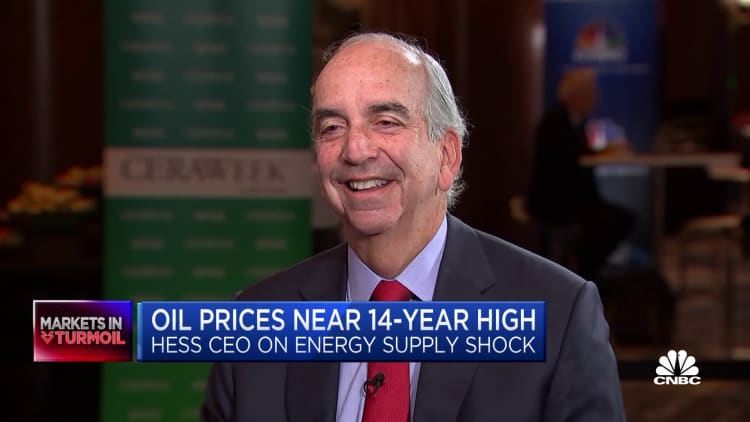As oil prices surge to the highest levels since 2008, Occidental Petroleum CEO Vicki Hollub said U.S. producers cannot increase output right away.
"We're in a really dire situation," she said Tuesday at CERAWeek by S&P Global. "We've never faced a scenario where we need to grow production, when actually supply chains not only in our industry but every industry in the world [are] being impacted by the pandemic."
U.S producers were largely expecting to keep production flat this year, and in the face of surging crude prices, output can't just be ramped up right away, Hollub said.
"Now, with supply chain challenges, it makes any kind of attempt to grow now — and at a rapid pace — very, very difficult," she said.
Production in the oil-rich Permian Basin is back around its pre-pandemic peak, according to Hollub, who noted the region faces significant challenges in boosting output. It's the only shale basin in the U.S. that can increase production, she said.
Part of the difficulty is the need to offset declines from wells in the region that are past their peak. Other obstacles to growth are reverberating throughout the economy, including labor shortages and issues securing raw materials. While the industry had prepared for these hurdles, it had not accounted for a scenario in which it needed to rapidly crank out oil supply.
"The call for incremental production in the United States, at this point, especially with the supply chain challenges, can't happen at the level that's needed not only for our country but for the world. We're in a significantly challenging scenario today," she said.
Energy companies have emerged from the pandemic within a wholly different industry. While in previous years, it was all about growth, now capital discipline is king. In the wake of the pandemic, companies focused on paying down debt, returning cash to shareholders and reining in spending.
Hollub said investors view capital discipline as "essentially no growth." Neverthless, she said Oxy has a "huge inventory of high-quality investments" that it could make around the world and especially in the U.S. shale basin, but for now it is focused on returning capital to shareholders. Last month, it announced plans to raise its quarterly dividend to 13 cents per share, up from 1 cent.
"I feel now that we do need to return cash to the shareholders in the form of dividends or buybacks, especially during the better cycles," she said, adding Oxy is positioning itself so that it's breakeven at $40 per barrel of oil.
West Texas Intermediate crude futures, the U.S. oil benchmark, traded around $126 per barrel on Tuesday.
A filing with the Securities and Exchange Commission Friday night showed that Warren Buffett's Berkshire Hathaway took a stake in the oil company. Berkshire owns 91.2 million shares of Occidental, worth $5.1 billion at Friday's closing price of $56.15.
Meanwhile, Carl Icahn has sold out of a 10% stake he had in the company, according to a report in The Wall Street Journal.



